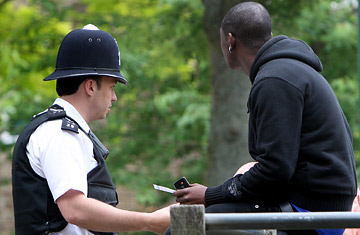
A police officer talks to a teenager
Give 'em a taste of their own medicine — that might as well be the motto of Operation Leopard, a new approach to policing adopted in the town of Pitsea in southeast England earlier this year. Local residents had complained of their deteriorating quality of life as reports poured in of mounting theft, vandalism and public drunkenness by gangs of petty criminals known as "hoodies" because of their preference for hooded sweatshirts. The local constabulary came up with an unlikely solution: "We basically decided to harass them," Fergus Caulfield of Essex Police says of the hoodies. Operation Leopard involves police officers targeting known offenders, openly filming them, stopping them repeatedly on the street, and hounding them at their homes. The goal, according to the operation's manual, is to make offenders feel the same sense of intimidation and disruption that they typically inflict on the law-abiding public. "We need to target offenders and make their lives as miserable as possible by any lawful means we can," the manual advises. "Put the shoe on the other foot ... after all, do we want criminals to be happy?"
That's the theory, anyway.
The operation has certainly been a roaring success in the town of 25,000. On a housing estate that usually reported five crimes a day, none were reported during a week-long trial run, prompting a local homeowners' association to raise $26,000 to help fund the operation for the rest of the year. And Britain's Home Secretary, Jacqui Smith, urged police forces across the U.K. to adopt similar programs.
But on the night TIME joined a patrol with a unit of the Essex police in mid-September, Operation Leopard hardly seemed like a mandate for police harassment. The officers, whose identities are being withheld in deference to concerns over retribution, had been given orders to hound 11 known offenders linked to vandalism and other petty crimes at The Craylands Estate, a public-housing project of nearly 3,000 on the outskirts of Pitsea. They were unable to locate most of their targets, and when they stopped two young men on their list — one sporting a stitched cut over his left eye and a busted lip, the other with his hood flipped up like the evil Emperor from Star Wars — their interrogation was thwarted by the pair's insistence on giving thumbs-up and demanding "cuddles" from a congregation of admiring teenage girls (who, bafflingly, obliged). The officers' initial attempts at intimidation ("Did you touch his hat?" one constable said in a menacing reference to the police cap his colleague had rested on a railing against which the young men were leaning) dwindled to good-humored teasing: "This isn't a camera, mate, it's an ugly meter," an officer said as he took pictures. Eventually, the cops seemed to give up. One of the young men even convinced the officers that taking his picture would infringe his human rights.
There's a reason for the officers' light touch. For years, British policing has been restrained by the 1981 abolition of the "Sus Law" that had allowed police to stop and search citizens simply on suspicion of criminal intent. "Sus" sparked riots in several British cities, amid charges that it sanctioned racist harassment of young black men. But a surge of youth violence — violent offenses by perpetrators aged under 18 rose 37% in three years to 2006 — has prompted the government to once again beef up the discretionary powers of cops on the street. "Dispersal orders," for example, allow officers to ban individuals from public spaces even if they have not been convicted at court, and to arrest them if they disobey. Operation Leopard is a part of this trend, and it is clear the officers are still unsure of how to wield their new powers.
Operation Leopard succeeds, then, by simply depositing officers in a trouble area, and letting their presence act as a deterrent. By the end of the night of TIME's visit, no crimes had been reported on the Craylands Estate. As one officers said later over a cup of tea back at the station: "They see that we are out in force and so they hide in their home. You can dress up what we do with fancy operational names, but it's just policing — you put bobbies on the street, and crime goes down. It ain't rocket science."
Perhaps not, but even the officers admit that their presence is only a short-term fix to an extremely complicated problem — an endemic lack of respect for traditional institutions among a generation of Britons like those loitering on the Craylands Estate. It would be too expensive, not to mention unpleasant, to have police patrolling every square inch of a town like Pitsea. And anyway,what good could they do in the long run, when schools, youth clubs and even families have failed? When the large, hysterical mother of one of the young men stopped by police came running in response to word that her son was in cuffs (he wasn't), she was met with a snarling rebuke: "You can [go] home now, mum, can't ya?"
"Okay," she replied with a weary resignation. "Your tea [dinner] is ready when you're finished."
